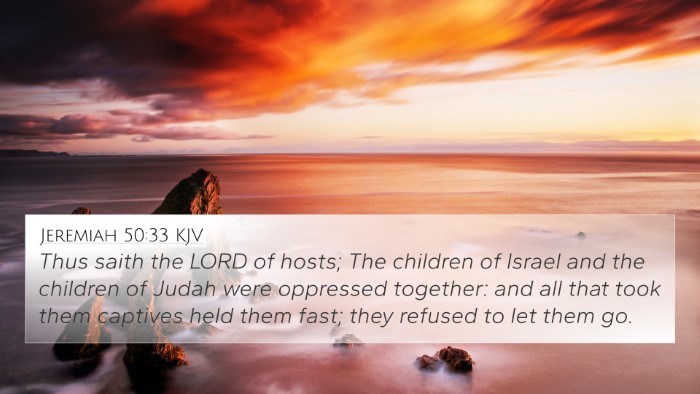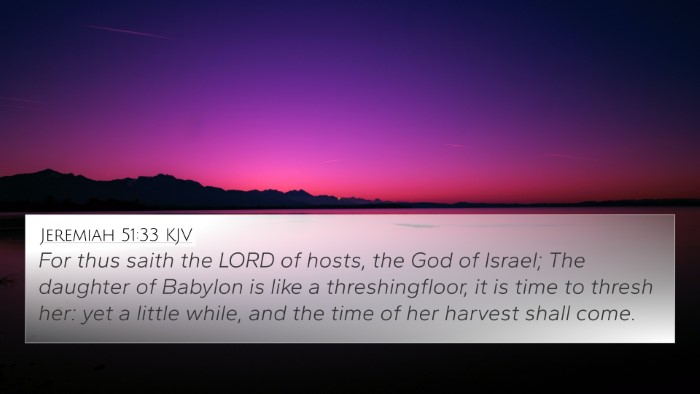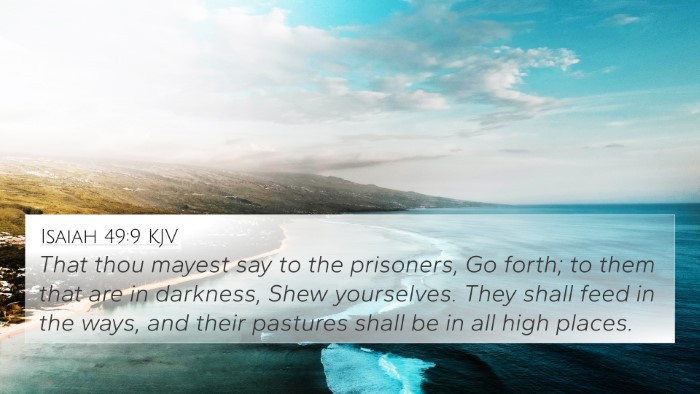Lamentations 3:34 - Summary and Interpretation
Lamentations 3:34 states: "To crush under one's feet all the prisoners of the earth." This verse is part of a larger lament, expressing deep sorrow over Jerusalem's destruction and the suffering of its people.
Understanding the Context
The Book of Lamentations is attributed to the prophet Jeremiah, written after the fall of Jerusalem. It reflects the anguish of God's people due to their sins and the consequences of divine judgment. In Lamentations 3, the author transitions from personal lament to a contemplation of God's justice and mercy.
Commentary Insights
-
Matthew Henry's Commentary emphasizes God's justice in punishing the wicked. He explains that God does not arbitrarily crush His people but allows suffering as a means of correction and justice.
-
Albert Barnes' Notes highlight the collective suffering and the sense of oppression experienced by the Israelites. Barnes notes that this verse illustrates the severity of divine discipline and the inevitability of consequences for sin.
-
Adam Clarke's Commentary expands on the metaphor of oppression, indicating that the 'prisoners' represent those unjustly treated. Clarke brings to light the hope that comes from understanding God's mercy, contrasting it with the cruelty of human nature.
Thematic Connections
This verse invites a deeper examination of themes like justice, mercy, and suffering. It contrasts the hard-heartedness of oppressors with the call for compassion in biblical teachings. The following cross-references enhance understanding:
- Isaiah 58:6 - "Is this not the fast that I choose: to loose the bonds of wickedness..." This verse reflects God's desire for justice and liberation from oppression.
- Psalm 79:11 - "Let the groans of the prisoners come before you..." This psalm echoes the cry for relief and vindication for those suffering injustice.
- Lamentations 3:34-36 - Further context within Lamentations enhances understanding of God's justice.
- Exodus 3:7 - "The LORD said, 'I have indeed seen the misery of my people...'" This showcases God's awareness of human suffering and His commitment to justice.
- Matthew 5:7 - "Blessed are the merciful, for they will be shown mercy." This teaches the importance of compassion, contrasting the cruelty mentioned in Lamentations.
- Romans 12:19 - "Do not take revenge, my dear friends, but leave room for God's wrath..." This verse underscores God's role as the ultimate judge.
- Galatians 6:7 - "A man reaps what he sows." This emphasizes the principle of divine justice and accountability.
- Zechariah 7:9 - "Administer true justice; show mercy and compassion to one another." This speaks to the heart of God’s call for His people to embody justice and compassion.
- Hebrews 10:30 - "For we know him who said, 'It is mine to avenge; I will repay.'" This reinforces the concept that ultimate justice belongs to God.
Cross-Referencing and Interpretation
Cross-referencing biblical texts enhances comprehension and reveals the interconnectedness of scripture. Studies show that examining similar themes can illuminate meanings not immediately apparent in a single verse. In the case of Lamentations 3:34, connections can be drawn between the sorrow expressed and the hope found in other scriptures regarding justice and mercy.
Application and Reflection
This verse and its related cross-references serve as tools for reflection on the nature of justice in the world. They highlight God's awareness of suffering and the eventual triumph of His righteousness. Believers are prompted to consider how they respond to injustice and to seek to emulate God's compassion in their lives.
Tools for Bible Cross-Referencing
Using a Bible concordance or a Bible cross-reference guide can aid in studying scripture more deeply. Here are some methods for effective cross-referencing:
- Identify key themes or words in the verse.
- Use a cross-reference system to find related passages.
- Engage in cross-reference Bible studies that explore connections.
Conclusion
Understanding Lamentations 3:34 requires consideration of broader themes of justice and mercy. By employing cross-referencing techniques, one can uncover layers of meaning within the scriptures, leading to a richer understanding of God's character and His treatment of humanity.












